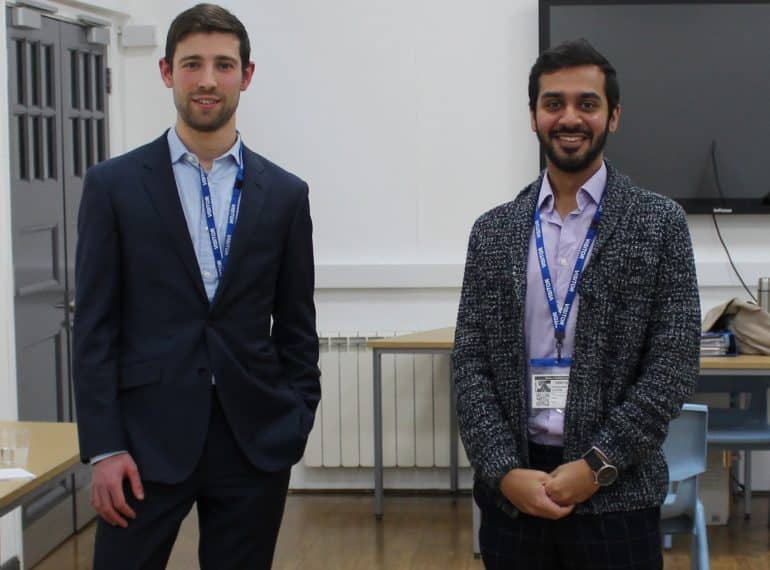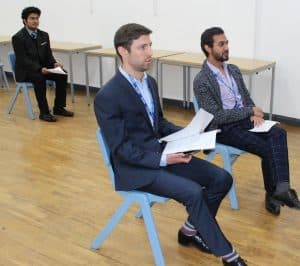
Two Old Elizabethans visited the School in person for a Covid-compliant celebration of International Men’s Day.
Jamie Sherman and Arjun Goswami talked about their experiences as members of the LGBTQ+ community, while also fielding questions from current sixth-formers.
 In their replies, they covered how legislation and attitudes have changed since they were at School, with neither feeling that being members of the LGBTQ+ community has held them back, although Arjun (OE 2001–2008) argued that the presence of “systemic homophobia” in society and in boys’ schools can lead to stigma, which in turn causes mental health issues.
In their replies, they covered how legislation and attitudes have changed since they were at School, with neither feeling that being members of the LGBTQ+ community has held them back, although Arjun (OE 2001–2008) argued that the presence of “systemic homophobia” in society and in boys’ schools can lead to stigma, which in turn causes mental health issues.
They spoke to an in-person audience in QE’s Conference Centre comprising some senior prefects, including the Equality, Diversion & Inclusion Ambassadors, while the event was live-streamed to tutor rooms across Years 9–13.
Afterwards, Jamie (OE 2002–2009) said: “It’s great to be back at QE and to catch up with everyone. Thank you for having us and letting us speak about LGBTQ+ issues. It’s fantastic to see the School pushing this conversation.”
Michael Feven, Assistant Head (Pupil Development), said: “I am hugely grateful to Jamie & Arjun for talking to the boys so honestly and openly about their experiences in this way. With the development of Perspective, our new student-led area of the School’s eQE online learning platform, and an ongoing review of our Personal Development Time curriculum, important conversations such as these are rightfully becoming an increasingly embedded part of life at QE”.
International Men’s Day, which was first celebrated in 1994, is promoted as an occasion to celebrate boys’ and men’s achievements and contributions, with an emphasis on promoting male role models. This year’s international theme was Better Health for Men and Boys.
Jamie is an Associate with a legal firm. He identifies as gay, ‘coming out’ when he was 24, but not feeling able to do so whilst at School. Arjun (OE 2001-08) is a qualified Cognitive Behavioural Therapist, and identifies as Queer/Pansexual; Arjun was keen to share his perspectives as a person of colour.
They presented slides giving some definitions of gender, sexuality and attraction. Much of the time, however, was devoted to answering questions, including the following:
What was your experience of realising you were gay whilst at School?
- Arjun; Being BAME (Black And Minority Ethnic) and at a boys’ school had made it even harder when trying to figure myself out – being called ‘gay’ was used as an insult. When I eventually came out, my family who are Hindu and liberal, was fine, but I have friends from other cultures who struggled to come out.
- Jamie: I realised I was gay at 14, but felt isolated at School, like something was wrong with me. I spent ten years ‘in the closet’, which took a massive psychological toll. [He referenced Section 28, the law which at that time made it illegal for schools to promote homosexuality]. It is a ‘fantastic development’ that talks like today can now happen in schools – it’s a completely different environment now.
What is it like being in the LGBTQ+ community as an adult?
- Arjun: When I was at School, I was worried about how my life would be as an adult, and actually I found it was totally fine. When I came out, I didn’t lose any friends, I became more confident, and found my sexuality (being pansexual i.e. attracted to an individual person, regardless of their gender/sexuality) didn’t hinder any area of my life – it was the opposite of what I had expected. The aim of today is normalising the idea that it’s fine to just be yourself – the barriers are less than before. And there is comfort in the fact that being LGBTQ+ is actually a protected characteristic under the Human Rights Act – it is illegal to discriminate [against LGBTQ+].
- Jamie: When the illusion of what society expects hits you – i.e. that you will grow up to have a wife and kids in the traditional way – that can be scary; but the reality is in contrast to what you expect. I have a male partner, I have friends and family, many of my friends are from School, we do everything that others do, we have the same holidays and social connection – I realise that the difference was all in my head. There is such a push for diversity and inclusion in all areas now. There was this notion that being LGBTQ+ will hold you back, but it’s just not an issue.
How does being LGBTQ+ impact your mental health?
- Arjun: There can be systemic homophobia in society and in boys’ schools – being heterosexual is what is expected. This can lead to low mood, low self-esteem, identity issues and anxiety – the fear of judgement. The biggest cause of death in males 16-25 years is suicide; being LGBTQ+ and BAME brings additional factors. 1 in 4 in the wider community have mental health issues – it is estimated this number grows to 1 in 3 within the LGBTQ+ community – due to the stigma. The message is to be respectful, be inclusive.
Does it hold you back, do people accept you?
- Arjun: Actually, it has made me more confident in who I am. To my face, I’ve not had much discrimination at all. My mum struggled the most, being from an Indian background; her biggest fear was that others would judge the family – but she’s not worried now.
- Jamie: In my first job in an office there was so much to take in, so I didn’t come out. I thought it would hold me back – but that couldn’t have been further from the truth. When I came out people just didn’t care – it’s just not a big deal any more.
Arjun said later: “It has been lovely to have spoken at QE, a school very special to me, … about a very important issue that is integral to embracing equality and acceptance for all.”
